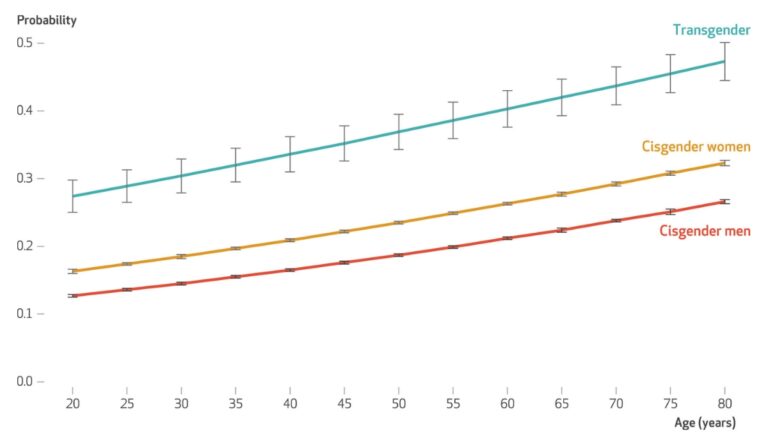Disability Among Transgender Adults
Transgender adults are more likely to report a disability than their cisgender counterparts, likely as a result of chronic stress.

Read Time: 2 minutes
Published:
In the United States, sixty-one million adults live with at least one disability. Research almost exclusively focuses on the experiences of cisgender people, or those whose gender identity matches the sex they are assigned at birth. Very little data exists on disabilities among transgender individuals.
Madeline Smith-Johnson analyzed data from the Behavioral Risk Factor Surveillance System between 2014 and 2020 to learn how experiences of disability vary between transgender adults and their cisgender peers between 20- and 80-years-old.
How disability is defined can determine an individual’s eligibility for benefits, civil rights protections, social stigma, and personal identity. For this study, Smith-Johnson classified disability as a functional limitation that impacts a person’s daily life, for example their ability to walk or climb stairs, dress or bathe themselves, run errands alone, concentrate, remember, or make decisions.
Transgender adults, as shown in the figure above, were more likely to report a disability than cisgender men and women. The study also found they were more likely to have a disability as they entered young adulthood, perhaps changing their life trajectory.
Smith-Johnson explains that increased rates of disability among transgender adults may be caused by chronic stress. A UCLA report shows transgender adults are over four times more likely to experience violence than their cisgender peers, including rape and aggravated assault, causing long-term negative health outcomes. Smith-Johnson notes that as transgender adults have a higher likelihood of disability throughout their lifetime, they will have increased needs for medical services. Yet, in 2021, forty-four bills across U.S. state legislatures were filed allowing medical care providers to refuse to care for transgender individuals based on religious justifications.
The current study’s findings depict an increased burden of disabilities among the transgender population, raising concerns about their access to health care. Smith-Johnson advocates for a federal policy to classify gender identity as a protected class to ensure equitable access.
Databyte via Madeline Smith-Johnson. Transgender Adults Have Higher Rates Of Disability Than Their Cisgender Counterparts. Health Affairs, 2022.



